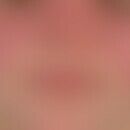DefinitionThis section has been translated automatically.
The question of whether there is a connection between the SARS-CoV-2 vaccination and the recurrence / worsening of autoimmune skin diseases cannot be answered with certainty. It has been widely reported that mRNA vaccines against SARS-CoV-2 activate the immune system non-specifically. Indeed, the mRNA SARS-CoV-2 vaccine can increase the production of type I interferon and activate RNA sensors such as Toll-like receptor 7 as well as components of the inflammasome, such as MDAD5(MDA5=acronym for: melanoma differentiation-associated protein= intracellular sensor for viral RNA that triggers the innate immune response) and nucleotide-binding oligomerization domain-containing protein 2(NOD2). In addition, some reports suggest that mRNA SARS-CoV-2 vaccines may have an impact on the development of inflammatory skin diseases(pityriasis rosea, fixed drug reaction, autoimmune diseases) (Ramot Y et al.2022; McClatchy J et al. 2022).
Occurrence/EpidemiologyThis section has been translated automatically.
In a meta-analysis with 200 publications on 6 common dermatological autoimmune diseases that occurred after SARS-CoV-2 vaccination (there is no difference between vector-based vaccines and mRNA vaccines in terms of new onset or worsening of the autoimmune diseases studied/ Hinterseher J et al. 2023), the following percentage distributions were found with regard to associated autoimmunological diseases (Hinterseher J et al. 2023).
- Bullous pemphigoid 32%
- Pemphigus vulgaris 6.7%
- Systemic lupus erythematosus 25%
- Dermatomyositis 21.1%
- Lichen planus 9.2%
- Leukocytoclastic vasculitis 15%
Bullous pemphigoid (BP): a new occurrence or worsening after SARS-CoV-2 vaccination affected n=66 patients, 32% of the total collective. Of 28 patients, 20 (approx. 70%) had a new onset of the disease, 8 (approx. 30%) a worsening. The interval between the SARS-CoV-2 vaccination and the worsening or recurrence of BP was between 2 and 11 days.
Pemphigus vulgaris: A new occurrence or worsening after the SARS-CoV-2 vaccination affected n=14 patients, 6.7% of the total collective. Of these 24 patients, 14 new occurrences/worsening of pemphigus vulgaris (PV) were recorded after SARS-CoV-2 vaccination, 8 new occurrences and 6 worsenings. The interval between the SARS-CoV-2 vaccination and the worsening or recurrence of PV was between five and 16 days.
Systemic lupus erythematosus: a new occurrence or worsening after the SARS-CoV-2 vaccination affected n=51 patients, 25% of the total collective. Seven patients were newly diagnosed with SLE, while four patients had a worsening of previously diagnosed SLE. The interval between SARS-CoV-2 vaccination and new onset/worsening of SLE was between four and 11 days.
Dermatomyositis: recurrence or worsening after SARS-CoV-2 vaccination affected 25 patients, 12.1% of the total collective. Individual cases are included. Without the indication "data without further information". Dermatomyositis had recurred 8 times after the SARS-CoV-2 vaccination. The time interval between the SARS-CoV-2 vaccination and the recurrence of the disease was between 1 and 8 days.
Lichen planus: a new occurrence or worsening after the SARS-CoV-2 vaccination affected n=19 patients, 9.2% (new occurrence/worsening) of a lichen planus (LP) after the SARS-CoV-2 vaccination. In 80% there was a new occurrence of LP after the SARS-CoV-2 vaccination, in 20% there was worsening after the SARS-CoV-2 vaccination. The time interval between the SARS-CoV-2 vaccination and the recurrence or worsening of the disease was between five and 14 days.
Leukocytoclastic vasculitis: A new onset or worsening after SARS-CoV-2 vaccination affected 31 cases, 15% of the total collective. 27 patients (about 96%) had a new onset of leukocytoclastic vasculitis, 1x had a history of LV. The time interval between vaccination and recurrence of skin lesions ranged from one to ten days.
Assessments: Although vaccination has been associated with worsening and recurrence of autoimmune disease, reviews suggest (Hinterseher J et al. 2023) that it is not associated with a higher risk of de novo manifestation or worsening of pre-existing autoimmune disease than other precipitating factors such as drugs, bacterial and viral infections.
You might also be interested in
EtiopathogenesisThis section has been translated automatically.
The mechanism of autoimmune reactions following vaccination is still unclear. On the one hand, a genetic predisposition to vaccine-induced autoimmunity is suspected, as only a few test subjects developed autoimmune diseases after vaccination. On the other hand, the immune system could trigger autoimmune diseases through cross-reactivity due to the similarity of some vaccine components with certain human proteins (so-called molecular mimicry). In addition, it has been postulated that the activation of toll-like receptors of antigen-presenting cells may play a role in the recurrence of autoimmune diseases after vaccination (Sagy I et al. 2022). It is known that tetanus toxoid, influenza and polio vaccines as well as other vaccines have an impact on the formation of autoantibodies and the development of autoimmune diseases such as rheumatoid arthritis, BP, PV, autoimmune myositis and SLE (Hinterseher J et al. 2023). Furthermore, influenza vaccines have been reported to induce a transient flare in approximately 19.4% of patients with SLE within 6 weeks (Crowe SR et al. 2011). There are also some cases in which SLE occurred after vaccination against hepatitis B, tetanus or typhoid fever.
Note(s)This section has been translated automatically.
In patients with autoimmune diseases who are receiving immunosuppressive therapy, various authors recommend vaccination against SARS-CoV-2. Authors recommend vaccination against SARS-CoV-2.
LiteratureThis section has been translated automatically.
- Chen Y et al. (2022) New-onset autoimmune phenomena post-COVID-19 vaccination. Immunology165: 386-401.
- Crowe SR et al. (2011) Influenza vaccination responses in human systemic lupus erythematosus: impact of clinical and demographic features. Semin Arthritis Rheum. 63: 2396-2406.
- Hinterseher J et al. (2023) Autoimmune skin diseases and SARS-CoV-2 vaccination - a meta-analysis.JDDG 21: 853-862
- McClatchy J et al. (2022) Fixed drug eruptions - the common and novel culprits since 2000. J Dtsch Dermatol Ges 20: 1289-1302.
- Ramot Y et al.(2022) Six cases of pityriasis rosea following SARS-CoV-2 vaccination with BNT162b2. J Dtsch Dermatol Ges 20: 1123-1124.
- Sagy I et al. (2022) New-onset systemic lupus erythematosus following BNT162b2 mRNA COVID-19 vaccine: a case series and literature review. Rheumatol Int 42: 2261-2266.
Outgoing links (13)
Bullous Pemphigoid ; Dermatomyositis (overview); Fixed drug eruption; Inflammasome; Leucocytoclastic vasculitis; Lichen planus classic type; Lupus erythematosus systemic; MDA5; Nod2; Pemphigus vulgaris; ... Show allDisclaimer
Please ask your physician for a reliable diagnosis. This website is only meant as a reference.




